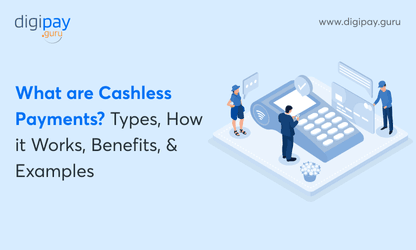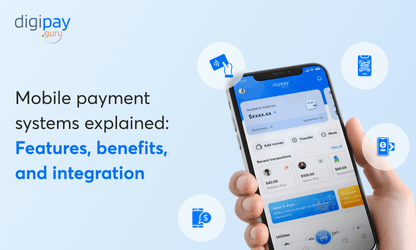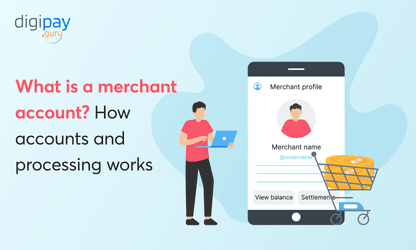The use of merchant payment solutions has gained widespread attention with e-commerce and digital transactions growing significantly. Indeed, Fortune Business Insights predicts that the global market for payment processing solutions would reach $ 116.17 billion by 2027.
This growth in payment solutions has also increased the number of security threats faced by merchants, making it more essential than ever for businesses to prioritize payment solution security.

In this blog, you will get a clear understanding that as a merchant what are the security concerns of merchant payment solutions. We will also discuss some pro tips for minimizing these concerns.
By taking the essential steps for security in merchant payment solutions, merchants can easily protect their businesses, and customers and maintain financial stability.
Understanding the Security Concerns of Merchant Payment Solutions for Business
Types of Security Threats
Card Skimming
Card skimming is a form of fraud in which fraudsters connect a device to a payment terminal, like an ATM or fuel station, for stealing credit card information.
Man-in-the-Middle Attack
In a man-in-the-middle attack, a hacker decrypts and changes communication between a merchant and its user. The payment information of a consumer, for example, could be stolen by hackers as it is being sent from the customer's device to the merchant's payment gateway.
Phishing Scams
Phishing scams are fake emails or websites used to steal personal data like credit card details or login credentials. These fraudsters frequently target businesses and their users, posing themselves as reputable sources in an attempt to brainwash victims into providing their personal information.
Data Breaches
A data breach occurs when sensitive information is stolen from a computer system or network. In the case of merchant payment services and solutions, data breaches can result in the theft of customer payment information, leading to significant financial losses and harm to a business's reputation.
Impact of Security Concerns on Merchants
Loss of Revenue
Security concerns can have a major impact on a merchant's bottom line. For example, in the event of a data breach, merchants may be liable for the costs of replacing compromised payment cards, as well as the cost of any fraudulent transactions that result from the breach.
Trust Damage
A security breach that results in the compromise of customers' payment information can have a lasting impact on their trust in the merchant. According to a National Cyber Security Alliance study, 60% of small businesses that experience a data breach go out of business within half a year.
Legal Ramifications
Besides financial losses, security breaches can also bring legal repercussions for various types of merchant payment solutions. The Payment Card Industry Data Security Standard (PCI DSS) imposes strict requirements for protecting customers' payment information and enforces penalties for non-compliance.
In the event of a data breach, merchants may also face legal action from customers whose information was affected.
Enhancing the Safety of a Merchant Payment Solution for Business
Essential Practices for Businesses
Protect Your Network and Equipment
A straightforward method to secure your online payment system is to protect your network and equipment, such as by implementing firewalls, establishing robust passwords, and keeping your software updated to fix any known vulnerabilities.
Adopt Strong Authentication Processes
Another method to secure your payment system is to adopt strong authentication processes, like two-factor authentication, to prevent unauthorized access to your payment systems and confidential information.
Encrypt Sensitive Data
Encryption is a potent tool for securing confidential information, like payment card numbers, during transmission and storage. By encrypting this data, you can guarantee that even if it's intercepted by an unauthorized individual, it will be unreadable and worthless.
Consistently Monitor and Improve Your Payment System
Continuously monitoring your payment system for any unusual activity and improving it to tackle any security weaknesses is a crucial step in maintaining your payment solution secure.
Picking a Reliable Payment Solution Provider
Investigate the Provider's Security Measures
When selecting a payment solution provider, it's vital to investigate their security measures, such as their encryption methods, data storage practices, and fraud prevention systems.
Search for PCI DSS Compliance
One of the must-have things or features of ideal merchant payment solution is the Payment Card Industry Data Security Standard (PCI DSS) is an industry-standard security framework designed to prevent credit card fraud. When choosing a payment solution provider, look for one that has adhered to PCI DSS to properly evaluate the security and compliance of merchant payment solutions and guarantee they're taking the necessary precautions to protect your customers' payment information.
Read More: Evaluating Security & Compliance in Merchant Payment Solutions
Evaluate the Provider's Reputation and Track the Record
Finally, evaluate the provider's reputation and track record when making your decision. Search for providers with a confirmed history of security and customer satisfaction, and steer clear of those with a past of security breaches or other negative incidents in the payment methods.
Case Study: A real-world example of security breaches and their impact
Nothing drives home the importance of securing customer information better than real-world examples of security breaches.
In this section, we'll explore a case study of a company that has experienced security breaches and examine what was done to address the issue and prevent future breaches. We'll also take a closer look at the impact these breaches had on merchants and their customers.
The Case of Equifax
One example of a security breach is the 2017 data breach at Equifax, which exposed the sensitive information of millions of customers, including Social Security numbers and birthdates. Equifax responded to the breach by offering free credit monitoring services, setting up a dedicated website for affected customers, and launching an internal investigation to determine the cause of the breach.
This case study highlights the importance of having a solid response plan in place in the event of a security breach.
What did we learn from the Equifax case?
From the Equifax breach, we can learn several lessons and best practices, including the importance of regularly monitoring systems for suspicious activity, updating software and systems to stay ahead of potential threats, and having a solid response plan in place in the event of a breach.
With these learnings from this case study, you can better protect your business and your customers' information.
The impact of these security breaches on merchants and their customers
Security breaches can have a significant impact on merchants and their customers. In the case of Equifax, the breach caused widespread concern and eroded customer trust in the company. Merchants need to understand the potential impact of a security breach and take proactive steps to secure customer information and prevent breaches from happening.
By doing so, you'll protect your customers' information, build trust in your brand, and minimize the potential impact of a breach.
Conclusion
With so many trends in merchant payment solutions security have become a major challenge for merchants looking to accept payment online or in person. From card skimming to phishing scams, merchants must be vigilant in protecting their customers' payment information and their own sensitive data.
Fortunately, by following best practices and choosing a secure payment solution provider, merchants can mitigate these security concerns and safeguard their businesses.
At DigiPay.Guru, we provide top-notch security in merchant payment solutions. From our encryption methods to our PCI DSS compliance, our team is dedicated to helping merchants protect their businesses and their customers.




